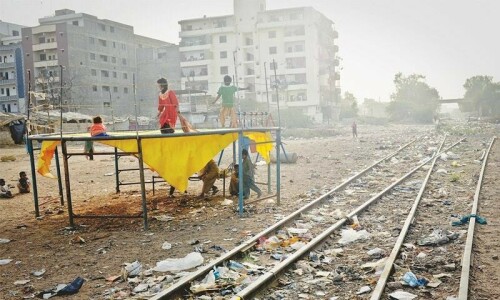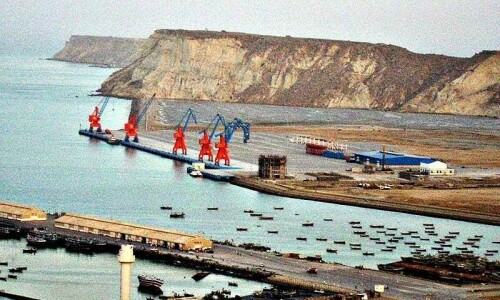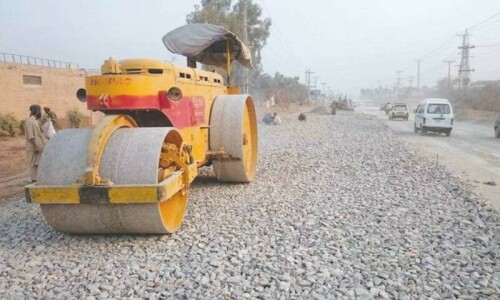ISLAMABAD: The federal government has decided to take chief ministers into confidence before capping or rearranging more than 335 federal-funded provincial projects to create a space of almost Rs150 billion during the current fiscal year.
The move is aimed at reducing federal expenditures to successfully complete the final review of the ongoing $3bn IMF programme slated for February with minimum additional taxation measures.
Sources told Dawn that the federal government had called a meeting of chief ministers, provincial finance ministers and chief secretaries with federal ministers for finance and planning on Thursday, but the meeting had to be put off because of the unavailability of two provincial chief ministers.
The huddle is again being arranged for Friday (today) or Monday to be presided over by caretaker Finance Minister Dr Shamshad Akhtar, who will also be having consultations with the Ministry of Planning today.
Move aims to cut federal expenses ahead of final IMF review, scheduled for February
Official documents seen by Dawn suggest that in the current fiscal year alone, provincial projects have an allocation of about Rs315bn, accounting for almost one-third of the Rs950bn federal Public Sector Development Programme (PSDP).
Therefore, the centre is in no mood to provide funds to more than 135 projects in the current fiscal year’s PSDP, which have seen zero progress so far. This alone, according to the Ministry of Finance, would create a cushion of about Rs115bn.
Second, another 50 projects with less than 20pc development would be taken up with the provinces for transferring them to provincial Annual Development Plans (ADP) with a fiscal space to the centre worth Rs30bn.
Third, the parliamentarians’ schemes going on in provinces under the so-called Sustainable Development Goals Achievement Plan (SAP) for the current year would be curtailed by another Rs30bn.
Some Rs61bn of the Rs91bn budgetary allocations had already been authorised for disbursement by the PDM-led coalition before Aug 8 and about Rs30bn had been spent, while remaining schemes were also under implementation. The SAP allocations would be frozen at Rs61bn.
Fourth, the provincial projects that have already achieved more than 80pc physical progress will
be completed within this fiscal year with a total focus on re-appropriations to ensure their economic and social return. There are less than two dozen provincial projects in this category.
The fifth and last category of about 150 projects pertains to areas where financial and physical progress ranged between 20pc and 80pc. The federal government is advising the provinces to critically review these projects and once a decision is made, their funding should be shared by the centre and the provinces.
This “strategic restructuring”, according to the federal government, has become inevitable to ensure that limited federal funds were utilised with the best economic outcome from a national perspective and avoid continuous bleeding of resources without targeted returns through project delays and cost overruns because of insufficient financing amid a large portfolio.
Besides such projects in four provinces, the centre had an inherent development responsibility for Azad Jammu and Kashmir, Gilgit-Baltistan and the tribal areas merged with Khyber Pakhtunkhwa, thus taking the overall federal development portfolio to about Rs9 trillion.
This included provincial projects of about Rs1.37tr at present — with the largest spread of Rs330bn in Sindh, followed by Rs315bn in Balochistan, Rs195bn in Punjab and Rs70bn in KP.
In addition, there are Rs390bn block allocations under different heads for financing provincial nature projects.
Dr Shamshad Akhtar told the provincial finance ministers two months ago about the need to limit federal funding for provincial development projects, particularly to devolved subjects, as part of fiscal consolidation measures to achieve targets committed to the IMF.
She had reminded the provinces of their responsibility to not only meet the provincial commitments for cash surplus but also prioritise development projects so that pressure on federal finances could be minimised.
Pakistan has to achieve primary surplus — the difference between total revenues and expenditures except interest payments — at 0.4pc of GDP (about Rs400bn) based on Rs600bn cash surpluses to be returned to the federal government by the provinces.
The international lending agencies, particularly the World Bank, had been asking the federal government to stop providing funds to provincial projects and devolved subjects, involving fiscal savings of more than Rs700bn. Besides development schemes, the federal government is also financing devolved responsibilities, such as vertical health projects.
Published in Dawn, December 15th, 2023















































Dear visitor, the comments section is undergoing an overhaul and will return soon.